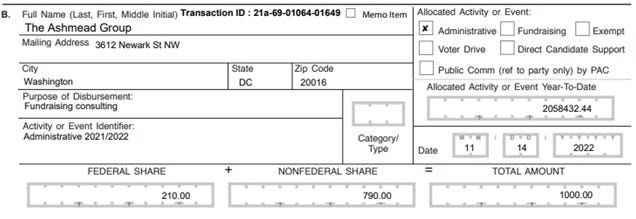Wyden is lying about role in $500k donation to Oregon Dems
Wyden spokesman said his campaign had "no role" in Nishad Singh's donation, but documents show Team Wyden's role violated federal campaign finance law.
U.S. Senator Ron Wyden’s (D-OR) longtime fundraising consultant appears to have violated federal campaign finance laws when she brokered a $500,000 donation from Nishad Singh, then an executive for cryptocurrency firm FTX, to the Democratic Party of Oregon (DPO) in October 2022.
Wyden consultant Diana Rogalle’s involvement in the controversial donation the DPO used to help elect Tina Kotek governor was first reported by the Oregon Roundup. A closer look at applicable federal law suggests Wyden’s involvement, even if indirect, runs afoul of Federal Election Commission (FEC) rules.
Moreover, the disclosure of Rogalle’s involvement in the Singh-DPO donation has far-reaching implications for the way Democrats win elections in Oregon. According to reporting by Hillary Borrud of The Oregonian, the $500,000 donation, and Wyden’s involvement in it, is but one instance - albeit the largest in dollar value - of the “coordinated campaign” program Oregon Democrats have used financed state elections in recent election cycles.
FEC rules provide that a federal officeholder, or his or her agent, may not solicit or direct a contribution to a state party in an amount greater than the applicable federal contribution limit. In 2022, federal officeholders were limited to soliciting or directing up to $10,000 from an individual donor to a state party. The Singh-DPO donation, the largest the DPO has ever received, is 50 times larger than the federal maximum.
The weight of available evidence indicates that Rogalle was acting as an agent of Wyden and at least directed funds from Singh to the DPO. FEC rules cover “agents acting on behalf of . . . an individual holding Federal office.” The earliest publicly available email clearly identifies Rogalle as Wyden’s agent, and does not mention the DPO:
For the uninitiated, Susan McCue was a political advisor to Singh’s then-employer, now-bankrupt, FTX. Mark Wetjen, a former Commodities Futures Trading Commissioner Obama administration official, was FTX’s Head of U.S. Policy. Wetjen’s FTX role included “communications with U.S. regulatory and legislative bodies, such as the CFTC, SEC and various House and Senate Committees.”
The Senate Finance Committee, which Wyden chaired in 2022 and now, is one of a handful of congressional committees that share jurisdiction over cryptocurrency regulation.
Fundraising consultant Diana Rogalle is, well, she’s “all things Ron Wyden.” The Wyden campaign has long paid Rogalle’s company, The Ashmead Group, handsomely for her fundraising services, including $6,500 in each of September and November 2022, encompassing the timing of her involvement with the Singh donation.
McCue identified Rogalle as an agent of Wyden in an email to Wetjen, whose job was to “communicate” with Wyden’s committee. According to publicly available records, Rogalle did not correct McCue or otherwise disavow that she was, as suggested by McCue, acting as Wyden’s agent in the transaction.
Rogalle’s role was to direct the $500,000 to the “OR coordinated campaign[.]” FEC rules define “to direct” as
to guide, directly or indirectly, a person who has expressed an intent to make a contribution, donation, transfer of funds, or otherwise provide anything of value, by identifying a candidate, political committee or organization, for the receipt of such funds, or things of value.
Rogalle unquestionably guided Singh to make his donation to the DPO by providing the wiring instructions and otherwise interfacing between the DPO and Singh. Part of her guidance involved other agents of Wyden.
Jocelyn Tyree is compliance director for Wyden’s campaign committee. Tim Leahy is Wyden’s campaign manager, as well as outreach director for Wyden’s official, taxpayer-funded Senate office. Amelia Manlove, is the compliance director for the DPO.
We can only speculate as to what, if any, solicitation by Rogalle or anyone else occurred prior to the September 29 email, but recall that it is a violation merely to “direct” a contribution in excess of $10,000. Soliciting such a donation would be an additional violation.
When confronted by The Oregonian’s Borrud with this damning paper trail, Wyden’s spokesman flatly denied any involvement in the DPO donation:
Hank Stern, a spokesperson for Wyden, was unequivocal in an email last week saying that the senator’s campaign had zero involvement in securing the big donation from the now-disgraced cryptocurrency executive. “The Wyden campaign played no role in this donation to the (Democratic Party of Oregon),” he wrote in an email. “The money was raised for the (Democratic Party of Oregon) by a fundraiser it retained to raise national money.”
Stern told The Oregonian Rogalle included Wyden campaign employees Tyree and Leahy in her October 3 emails to “keep the members of the campaign team responsible for working with the coordinated campaign in the loop.”
Stern’s “no role” claim is dispositively disproven by the September 29 and October 3 emails alone, which demonstrate that Rogalle, identified to FTX’s representatives exclusively as Wyden’s agent, directed the funds to the DPO, in the process involving other of Wyden’s agents.
Stern’s two statements to The Oregonian are contradictory. At the very least, Tyree and Leahy, “responsible for working with the coordinated campaign” were “in the loop.” That’s a role in and of itself, even setting aside Rogalle’s involvement.
Team Wyden’s contention that Rogalle was, despite the understanding of all the parties to the September 29 email, working as an agent of the DPO, relies upon the slender reed of one FEC filing by the DPO.
The DPO reported that it paid Rogalle’s company $1,000 on November 14, 2022, for “fundraising consulting.” This was the first time the DPO had ever reported paying Rogalle or her company, according to state and federal records. It reported making an identical payment to her January 10, 2023.
DPO made the first payment 13 days after The Oregonian broke the story that the DPO had misreported the source of the donation, and shortly after the Oregon Secretary of State’s office commenced an investigation into the matter. The emails disclosing Rogalle’s involvement with the donation were eventually made public only as a result of that investigation.
The DPO made its second, and to this date final, reported payment to Rogalle’s company once the Secretary of State probe was well underway and four days after Willamette Week first reported the U.S. Department of Justice was investigating Singh for his role in making fraudulent campaign contributions.
Neither the DPO nor Rogalle have made public any contract for services between the two, nor invoices for Rogalle’s services. Even if Rogalle was hired as a fundraising consultant by the DPO prior to her work directing the Singh donation, federal law does not require that an agent work exclusively for her federal officeholder client in order for the agent and the client to have violated the law. In this case, Rogalle held herself out as an agent of Wyden’s, and not the DPO’s.
Finally, there is the matter of the “coordinated campaign.” The Oregonian’s Borrud defined the Oregon Democrats’ coordinated campaign:
It is common for state-level political parties to run coordinated campaigns that strategically combine fundraising by federal and state candidates and target the money they collectively raise to critical get-out-the-vote activities, three sources with knowledge of Oregon Democrats’ coordinated campaigns told The Oregonian/OregonLive. Politicians with the greatest ability to raise money are typically expected to kick in the most. The practice allows candidates in tighter races, such as a gubernatorial candidate, to benefit from the fundraising abilities of other candidates, especially an incumbent such as Wyden, who holds a powerful Senate committee leadership position and was widely expected to win reelection in 2022.
The people familiar with Democrats’ coordinated campaign efforts, who requested anonymity in order to freely discuss party practices, said that with the exception of the party’s coordinated campaign director Aisling Coghlan, it is not Democratic Party of Oregon employees but rather
experienced campaign staffers associated with politicians in higher offices who direct fundraising and get-out-the-vote strategies for Democrats’ coordinated campaigns.
This comports with what my Oregon Democratic sources (yes, I have them!) have told me off the record about the coordinated campaign. It is premised upon Wyden and other congressional Democrats helping to raise money for the DPO’s closing get-out-the-vote efforts to help Democratic state candidates win. This approach funnels contributions from sources with interests in federal policy, who wish to curry favor with congressional leaders, to help sustain Democratic hegemony over Oregon state politics.
Far from “no role,” Wyden’s influence over federal policy is the raison d’etre of the Democrats’ coordinated campaign. When, as in the case of Singh, Wyden or his agents direct a contribution to the DPO’s coordinated campaign in excess of $10,000, Wyden has violated federal law. The same would be true of any such contributions directed by other Oregon congressional democrats to the DPO’s coordinated campaign.
What began as a story about a misreported contribution now implicates and imperils Oregon’s most powerful elected official, and the means by which he and his colleagues help Democrats win in Oregon.








Come, Watson, come! The game is afoot. Not a word! Into your clothes and come! - Sir Arthur Conan Doyle (from King Henry IV, ca. 1597, William Shakespeare). I wonder how far the Feds will take this?
Corruption in the DPO, Who Knew